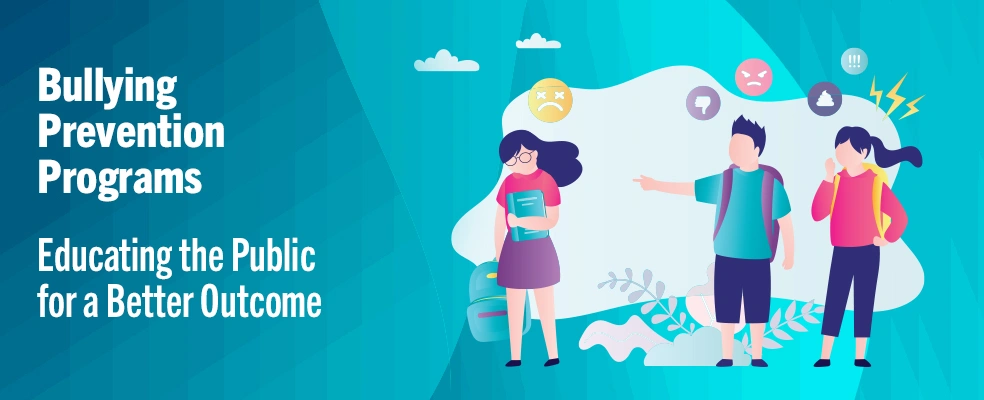
Being persistently bullied has been shown to impact children’s mental health in many ways, including the potential for depression, anxiety, substance use disorders, and suicidal ideation. It remains widespread in schools, where it has also been linked to lower academic performance and absenteeism. Fortunately, there are several bullying prevention programs available with helpful information for counselors, schools, parents, children, and those who have been affected by witnessing it.
The Centers for Disease Control and Prevention (CDC) gives bullying a broad definition: “any unwanted aggressive behavior(s) by another youth or group of youths, who are not siblings or current dating partners, that involves an observed or perceived power imbalance, and is repeated multiple times or is highly likely to be repeated.” It takes many forms—physical, verbal, social, even damage to a person’s property—and social media has created a new avenue where cyberbullying remains a concern.
Bullying is also more common than you may think. The CDC has found that 1 in 5 high schoolers have reported being bullied at school, and 1 in 6 have been bullied online in the past year. Stopbullying.gov, a U.S. government resource, reports similar numbers for students ages 12–18 (20%).
Today there are several bullying prevention programs available for purchase, but the intention of this article is to make readers aware of free resources. We encourage you to do your own research; our inclusion of these programs is not an endorsement.
- Stopbullying.gov is a U.S. government site containing information on what schools can do to prevent bullying and how to put policies and rules in place. The site covers engaging parents and youth; cyberbullying; helping children build resilience; and more. Its free Training Center offers downloadable research-based modules for working with stakeholders and a downloadable Community Action Toolkit is also available.
- The CDC includes information about bullying in its youth violence prevention content. It lists fast facts and statistics, information about safety for the disabled, adverse childhood experiences, risk factors, and more. Its Comprehensive Technical Package for the Prevention of Youth Violence and Associated Risk Behaviors is a free download with strategies to prevent and reduce bullying.
- Pacer’s National Bullying Prevention Center has several free downloadable resources for parents, educators, and K–12 students. Pacer promotes National Bullying Prevention Month each October, encouraging anyone focused on unity to wear orange as a show of support. The site contains quick guides and handouts such as Bullying Prevention 101. A 4-week student activity kit for classrooms includes theme weeks, projects, and other ways to foster engagement and promote inclusion.
- Committee for Children has a wealth of videos and articles explaining bullying, who is affected, how to prevent it, and more. The information is geared toward parents, educators, and bystanders, including free activities, a book list, and research links. The site also features information about advocacy efforts to promote child well-being.
- Coalition for Children offers its free Take a Stand program to help parents and teachers to understand bullying among children from kindergarten to fifth grade, and to prevent and stop it. The website has introductory videos explaining the program, which includes exercises on learning to be inclusive.
- Stompoutbullying.org was created in 2005 to help children in need. The site features a help chat line for kids and teens, special events, toolkits, and a library of articles for students, educators, and parents. The organization also encourages the observation of World Bullying Month in October and offers suggestions for ways to become involved.
Bullying is a serious problem with far-reaching effects on mental health. Successful prevention requires a collaborative effort. As counselors working together with students, families, educators, and other school personnel, we can raise awareness, increase sensitivity and respect for others, and create a better environment for students to thrive.